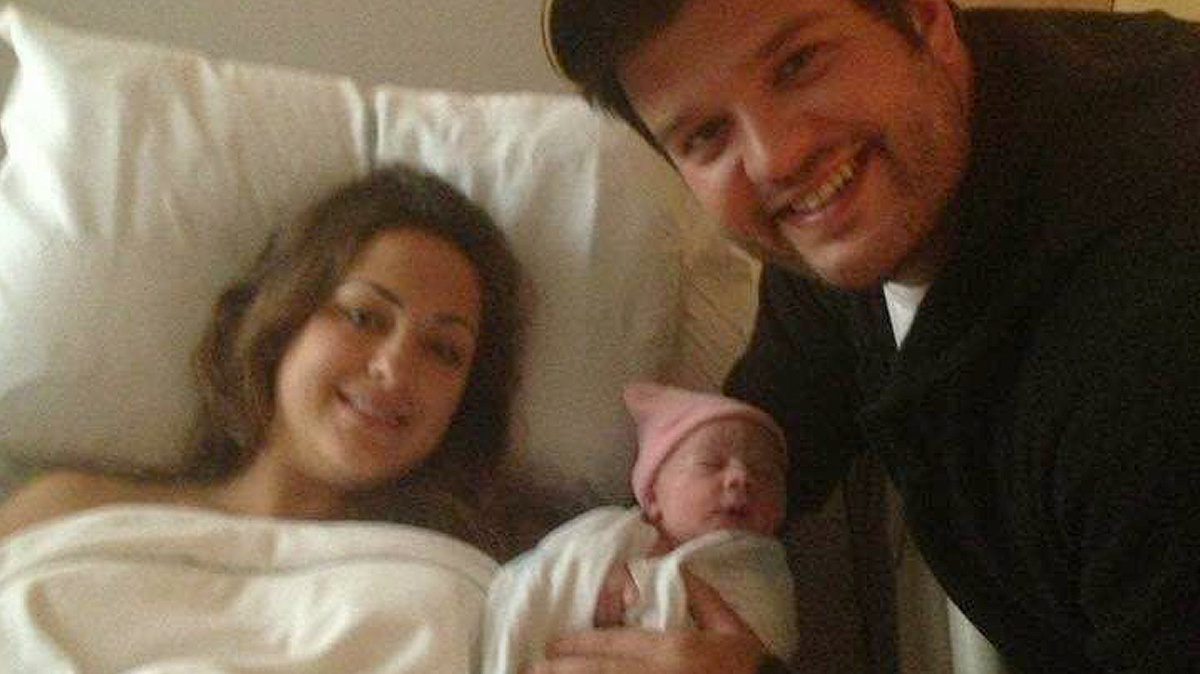
Steven D’Achille noticed a difference in his wife Alexis as soon as she’d given birth to their baby girl. The first-time mom had just experienced a traumatic delivery where her daughter, Adrianna, wasn’t able to breathe.
Steven, 36, said his once lively, happy wife seemed lost and despondent following their daughter's delivery.
“It was the beginning of the end,” Steven told TODAY Parents.
The Pittsburgh dad said his wife’s troubled mood continued after they returned home with their baby. “Alexis would just cry and cry and say, ‘I can’t do this,’” Steven said. “I would find her on the closet floor, on the ground, crying her eyes out.”
Doctors kept trying to reassure the couple that Alexis had the “baby blues” and she’d improve with time.
The couple would eventually visit seven different crisis centers and hospitals trying to get help.
Alexis’ antidepressant medication was doubled, but it made things worse. In a conversation with her husband, who she called by the nickname, “Pop,” Alexis hinted at something dark.
“She said ‘Pop as soon as I got on the (medication) it is making me have all these bad, bad thoughts,’” Steven said.
On their wedding anniversary in October 2013, Alexis asked for help one final time.
Steven says his wife begged him to take her to a hospital, where she told the doctor she was having suicidal thoughts and had a plan in place.
But once again, the doctor told Alexis she would get better and sent her home.
“The doctor pulled me aside and said, ‘She is going to be fine,’” Steven remembers. “I can’t believe I was stupid enough to listen to him.”
Alexis attempted suicide the next morning.
“I could hear the baby crying downstairs, hysterical. My heart just hit the floor and I knew something bad had happened,” Steven said.
He called 911 and performed CPR until paramedics took Alexis to the hospital.
She died two days later. Their daughter Adriana was only 6 weeks old.
Steven would later learn that Alexis was suffering from postpartum psychosis. According to Postpartum Support International, the condition is rare, with the condition occurring in only .1 to .2 percent of births. But the onset is usually sudden and the results severe, with a 5 percent suicide rate and a 4 percent infanticide rate.
Steven said he was overwhelmed with grief and anger. He knew right then he had to make something meaningful come from his wife’s death.
“How is it possible there are no resources for moms when they have a baby? This is so unfair,” he said.
To channel his grief, he decided to find a way to spare other families from experiencing what he had just gone through: devoting himself to changing postpartum mental health care.
“I want to fix the problem,” he said. “My daughter isn’t the only kid without a parent and I’m not the only husband without a wife (because of suicide).”
Steven started a nonprofit, The Alexis Joy Foundation, and worked with other health agencies in Pittsburgh to found a new facility, the Alexis Joy D’Achille Center for Women’s Behavioral Health.
The center is different from other facilities in that it provides two levels of care. It offers an outpatient program where mothers and expectant mothers meet weekly with a therapist. In addition, it provides another more intensive program where mother and baby meet for three-hour sessions, three days a week, to emphasize and facilitate that parental interaction.
The new facility helps moms deal with postpartum anxiety and helps foster bonding through infant massage, baby wearing, mom and baby yoga, and providing many spaces for breastfeeding.
Steven is using the hashtag #MyWishForMoms to raise awareness of his crusade and the issue of postpartum mental health.
“My wish is that mama’s everywhere have access to care with their babies next to them,” he wrote in a Facebook post.
“Care they deserve. The care my wife never got.”
Steven says Alexis would be happy that she is helping others.
“She would be really proud,” he told TODAY Parent. “I think about the lives these children get, a normal life, because of the services we offer."



